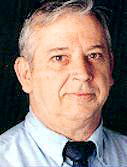What President Bush does not understand (don’t worry, I’m not going through the whole list) is that credibility, like virginity, cannot be recovered once it’s lost.
He thinks it’s unimportant that he took the country to war based on the false claim that Saddam Hussein had amassed large amounts of chemical and biological weapons and was on the verge of handing them to terrorists. His attitude is: "Hey, what’s your problem? We got rid of a bad guy."
Well, the problem is that now any American who believes anything the Bush administration says without a ton of proof to back it up is a fool. Fool me once, shame on you; fool me twice, shame on me. Like a lot of old sayings, it’s a basic truth. Do you really think an administration that would lie about reasons for going to war won’t lie to further its re-election efforts or to cover up other blunders?
I know that for a lot of young people, Watergate and the Vietnam War are now "that real old stuff," as a baby sitter once described any history that had occurred prior to her puberty. But for many Americans of that generation, it was their first exposure to wholesale lying by the federal government. My own first exposure had occurred in the 1950s, when I caught the U.S. Department of Agriculture in a pack of lies about imported fire ants.
So, do you think the Bush administration is telling you the truth about mad cow disease? I don’t. The Bush administration says that the discovery of one case of mad cow disease poses a minimal risk. Well, what exactly is the minimal risk of a disease that is 100 percent fatal and incurable? "Minimal," when it comes out of the mouth of a bureaucrat, is a code word for acceptable. In other words, a few dead Americans are an acceptable price to pay for preserving a multibillion-dollar beef industry. That’s fine, unless you happen to be one of the dead ones.
If the risk is so minimal, why are they trying to recall all of the meat? They have told us that the most dangerous parts of a sick cow are the spinal cord and brain, and that these were "left out of the food chain." Do you think slaughterhouses debone cows with surgical precision? That’ll be the day.
The human form of mad cow disease is called Creutzfeldt-Jakob disease, or CJD. Did you know there are about 300 cases of CJD in the United States every year? Did you know that clusters of CJD have occurred in: Pennsylvania in 1993, Florida in 1994, Oregon in 1996, New York in 1999—2000, and Texas in 1996? These cases were all classified as "sporadic," which sounds to me much more like semantics than science. Usually, clusters of disease are indicative of an environmental factor.
Laura Manuelidis, section chief of surgery in the neuropathology department at Yale University, conducted a 1989 study that found that 13 percent of people who died after being diagnosed as having Alzheimer’s disease actually had died of CJD.
"Now people are beginning to realize that because something looks like sporadic CJD, they can’t necessarily conclude that it’s not linked to mad cow disease," she told United Press International.
There is no good tracking system for CJD, and obviously no good tracking system for cows with mad cow disease. Think about this: If you’re a cattleman and you find a sick cow you suspect of mad cow disease, what is in your selfish interest: to report it and lose your whole herd or shoot it and bury it? If you’re a bureaucrat in the USDA, what is in your self-interest: to tell the truth and have the agribusiness lobbyists howling for your scalp or to follow the administration line? I’m not saying that altruists don’t exist, but they are rare birds in the human flock.
As of now, hamburger I don’t grind myself and all other processed meats are off the menu. I would advise you to take the same steps.
Otherwise, one day, you might hear the president say: "Hey, what’s your problem? We preserved the beef industry." There are some things I aspire to, but being part of the acceptable price for achieving somebody else’s political and economic goals is not one of them.
 Charley Reese has been a journalist for 49 years, reporting on everything from sports to politics. From 1969—71, he worked as a campaign staffer for gubernatorial, senatorial and congressional races in several states. He was an editor, assistant to the publisher, and columnist for the Orlando Sentinel from 1971 to 2001. He now writes a syndicated column which is carried on LewRockwell.com. Reese served two years active duty in the U.S. Army as a tank gunner.
Charley Reese has been a journalist for 49 years, reporting on everything from sports to politics. From 1969—71, he worked as a campaign staffer for gubernatorial, senatorial and congressional races in several states. He was an editor, assistant to the publisher, and columnist for the Orlando Sentinel from 1971 to 2001. He now writes a syndicated column which is carried on LewRockwell.com. Reese served two years active duty in the U.S. Army as a tank gunner.




